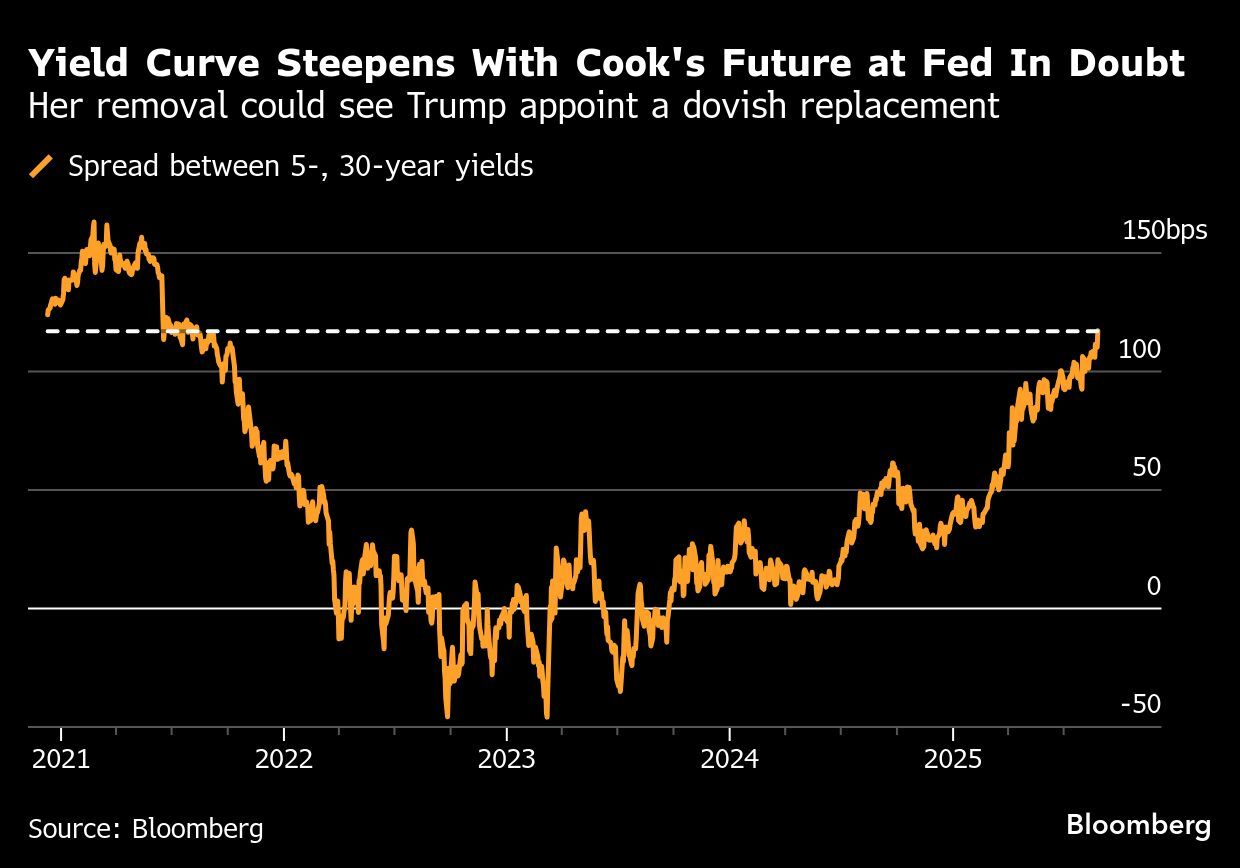(Bloomberg) — Long-dated US Treasuries were lagging the market and retained modest losses as President Donald Trump intensified efforts to oust Federal Reserve Governor Lisa Cook, deepening concerns his attacks on the central bank’s independence and lobbying for lower interest rates will fan inflation.
The yield on 30-year bonds rose as much as five basis points to 4.94%, before trimming advance. In contrast, the two-year yield fell five basis points to a session low of 3.67% after a well received $69 billion auction at 1pm in New York.
While the moves were relatively small, investors and strategists were speculating in their morning trading notes that price pressures may heat up if Trump succeeds in replacing Cook with a policymaker more inclined to lower borrowing costs. The President has repeatedly complained that Fed Chair Jerome Powell and his colleagues have been too slow to cut rates.
“The President is going to remake the Board Governors of the Federal Reserve over the next year, and he’s doing so in very unconventional ways,” said Jamie Cox, managing partner for Harris Financial Group. That approach has “essentially usurped” the Fed’s forward guidance function for now, telling markets lower rates are coming, he added.

Trump sought to remove Cook following allegations she falsified documents on a mortgage application. Cook said she will not resign and disputed Trump’s authority to fire her.
The push to dismiss Cook “is a good reminder that no institution in Washington can insulate itself from Trump’s bullying,” said Sarah Binder, political science professor at George Washington University. “Nor are claims of ‘independence’ sufficient to protect the Fed from Trump’s ambitions. The Fed needs defenders, especially bond traders.”
What Bloomberg Strategists Say
“The more the Fed cuts rates, the greater the threat that longer-dated yields will stay higher. It’s one thing to loosen policy in the face of well-entrenched disinflation, but quite another when price increases are running above target inflation.”
—Ven Ram, Macro Strategist. Click here to read the full analysis.
Read more: Trump Moves to Fire Fed’s Cook, Setting Up Historic Legal Fight
Pressure on Cook follows an aggressive campaign by Trump to force Powell — whose term as Chair expires in May — to stand down early, with the search for his replacement already underway. Trump appointed Council of Economic Advisers Chairman Stephen Miran, a long-time supporter, to serve the expiring term of Fed Governor Adriana Kugler, who resigned early this month.
Two-year yields, which are among the most sensitive to monetary policy, were lower befor the auction amid speculation the Fed will cut interest rates as soon as next month. The gap between five and 30-year US yields widened seven basis points to 117 basis points — the steepest since 2021.
While the short-end is gaining on the potential for a “more dovish replacement” for Cook, the long-end yield is “higher on the inflationary potential of that and the loss of Fed independence,” said John Briggs, head of US rates strategy at Natixis North America.
While the Fed has yet to lower borrowing costs this year, Powell used his speech at the Jackson Hole symposium last week to indicate a rate cut may be warranted to support the labor market. On Monday, Federal Reserve Bank of New York President John Williams said the era of low neutral interest rates “appears far from over.”
Simmering tensions
The latest development comes as tensions continue to simmer over the US budget deficit after the House passed a $3.4 trillion fiscal package that cuts taxes and curtails spending on safety-net programs. Traders will be watching to see how this week’s Treasury auctions, which include five- and seven-year tenors, are received by market participants.
When S&P Global Ratings recently affirmed the AA+ credit score of the US, it warned that the country’s ratings “could come under pressure if political developments weigh on the strength of American institutions and the effectiveness of long-term policymaking or independence of the Federal Reserve.”
After falling sharply in the first half of the year, the dollar has largely stabilized since June. But fresh questions over Fed autonomy may test that recent resilience. The Bloomberg Dollar Spot Index dipped 0.2% on Tuesday.
“Challenges to Fed independence pose clear downside risks to the dollar in our view, owing in this case to both concerns around US institutions, and to the read-through to lower front-end US yields,” Goldman Sachs Group Inc. strategists including Stuart Jenkins wrote in a note.
© 2025 Bloomberg L.P.
#Threat #Feds #Cook #Spurs #Inflation #Worry